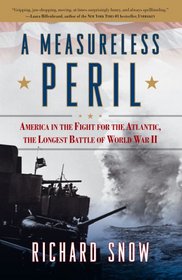The longest battle of World War II was the Battle of the Atlantic, lasting from very early September 1939 until early May 1945. It was fought to ensure the waters were safe for Allied shipping, essential for supporting Britain and Allied campaigns around the world. Not only were materials traveling east to support the campaigns in Europe, but raw material was traveling across the Atlantic to the U.S. to create those materials. Germany realized this and did its utmost to sink shipping, and it almost succeeded. Still the Allies paid a great price in lives and ships. Some of it due to their own stupidity.
There are numerous books which describe the Battle of the Atlantic, or parts of it, in detail, and I've read a number of them. But none does as good as job as this one in giving an overall analysis of the difficulties---and their solutions---the Allies and the Germans faced. And the author does it in a way that even a reader with a casual interest will find enjoyable and instructive.
The author mentions that his father---who trained as an architect, and who served as an officer on a destroyer escort---was told in college he should be a writer, due to his ability with words. The author must have inherited that ability,, as he has written an entertaining story about a terrible conflict which claimed so many lives.
Not only does Richard Snow devote chapters to explaining how the Allies made major decisions in combating the U-Boats, but he also personalizes those chapters with real people to the extent that even someone not interested in World War II will find this story enjoyable reading.
The author also covers some events---little known today--- that many will find interesting. For example, he relates the story of the sinking of the U.S.S. Stephen Hopkins, a lightly armed merchant ship which in turn sunk a heavily armed German raider. Why this wasn't made into a movie after the War I don't know. Probably because people might believe Hollywood made it up. Then there was the story of the Royal Australian Navy Sydney, a cruiser which went missing during the war. Only years later was it discovered the Sydney and a German raider sunk each other.
My only problem with the book is Snow underplayed Admiral King's dislike of the British. King's Anglophobia was such he refused to order ships to sail in convoys as he thought that a British idea, whereas an American conceived it in World War I. As a result, hundreds of ships and thousands of lives were lost. King only changed his mind when President Roosevelt told him to do it or he would find someone to replace King. If you do enough reading about World War II, and other wars, you often find many commanders let their egos make their decisions for them, and the tragedies which then occurred were swept under the rug to protect their reputations.
There are numerous books which describe the Battle of the Atlantic, or parts of it, in detail, and I've read a number of them. But none does as good as job as this one in giving an overall analysis of the difficulties---and their solutions---the Allies and the Germans faced. And the author does it in a way that even a reader with a casual interest will find enjoyable and instructive.
The author mentions that his father---who trained as an architect, and who served as an officer on a destroyer escort---was told in college he should be a writer, due to his ability with words. The author must have inherited that ability,, as he has written an entertaining story about a terrible conflict which claimed so many lives.
Not only does Richard Snow devote chapters to explaining how the Allies made major decisions in combating the U-Boats, but he also personalizes those chapters with real people to the extent that even someone not interested in World War II will find this story enjoyable reading.
The author also covers some events---little known today--- that many will find interesting. For example, he relates the story of the sinking of the U.S.S. Stephen Hopkins, a lightly armed merchant ship which in turn sunk a heavily armed German raider. Why this wasn't made into a movie after the War I don't know. Probably because people might believe Hollywood made it up. Then there was the story of the Royal Australian Navy Sydney, a cruiser which went missing during the war. Only years later was it discovered the Sydney and a German raider sunk each other.
My only problem with the book is Snow underplayed Admiral King's dislike of the British. King's Anglophobia was such he refused to order ships to sail in convoys as he thought that a British idea, whereas an American conceived it in World War I. As a result, hundreds of ships and thousands of lives were lost. King only changed his mind when President Roosevelt told him to do it or he would find someone to replace King. If you do enough reading about World War II, and other wars, you often find many commanders let their egos make their decisions for them, and the tragedies which then occurred were swept under the rug to protect their reputations.




![header=[] body=[Get a free book credit right now by joining the club and listing 5 books you have and are willing to share with other members!] Help icon](/images/question.gif?v=90afaeb39)
